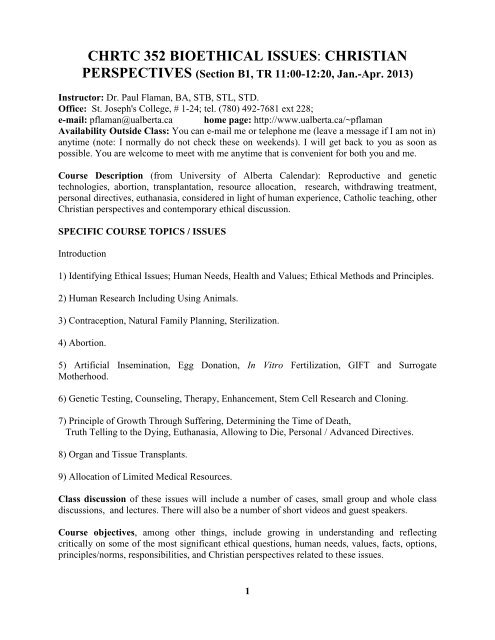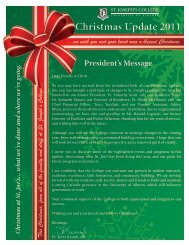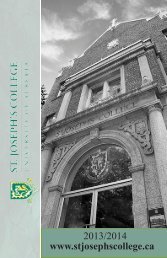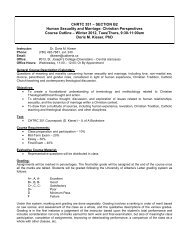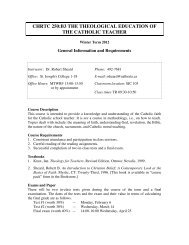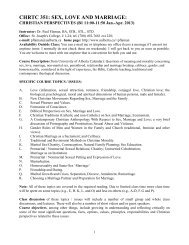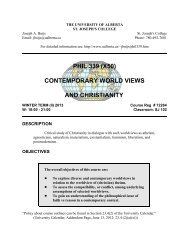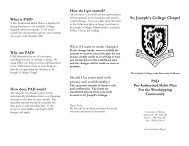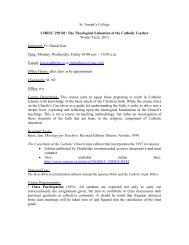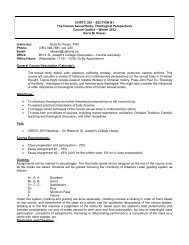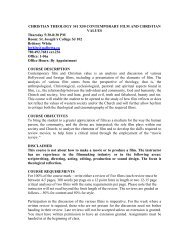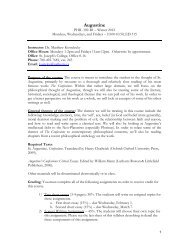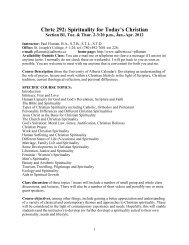CHRTC 352 BIOETHICAL ISSUES: CHRISTIAN PERSPECTIVES ...
CHRTC 352 BIOETHICAL ISSUES: CHRISTIAN PERSPECTIVES ...
CHRTC 352 BIOETHICAL ISSUES: CHRISTIAN PERSPECTIVES ...
You also want an ePaper? Increase the reach of your titles
YUMPU automatically turns print PDFs into web optimized ePapers that Google loves.
<strong>CHRTC</strong> <strong>352</strong> <strong>BIOETHICAL</strong> <strong>ISSUES</strong>: <strong>CHRISTIAN</strong><br />
<strong>PERSPECTIVES</strong> (Section B1, TR 11:00-12:20, Jan.-Apr. 2013)<br />
Instructor: Dr. Paul Flaman, BA, STB, STL, STD.<br />
Office: St. Joseph's College, # 1-24; tel. (780) 492-7681 ext 228;<br />
e-mail: pflaman@ualberta.ca home page: http://www.ualberta.ca/~pflaman<br />
Availability Outside Class: You can e-mail me or telephone me (leave a message if I am not in)<br />
anytime (note: I normally do not check these on weekends). I will get back to you as soon as<br />
possible. You are welcome to meet with me anytime that is convenient for both you and me.<br />
Course Description (from University of Alberta Calendar): Reproductive and genetic<br />
technologies, abortion, transplantation, resource allocation, research, withdrawing treatment,<br />
personal directives, euthanasia, considered in light of human experience, Catholic teaching, other<br />
Christian perspectives and contemporary ethical discussion.<br />
SPECIFIC COURSE TOPICS / <strong>ISSUES</strong><br />
Introduction<br />
1) Identifying Ethical Issues; Human Needs, Health and Values; Ethical Methods and Principles.<br />
2) Human Research Including Using Animals.<br />
3) Contraception, Natural Family Planning, Sterilization.<br />
4) Abortion.<br />
5) Artificial Insemination, Egg Donation, In Vitro Fertilization, GIFT and Surrogate<br />
Motherhood.<br />
6) Genetic Testing, Counseling, Therapy, Enhancement, Stem Cell Research and Cloning.<br />
7) Principle of Growth Through Suffering, Determining the Time of Death,<br />
Truth Telling to the Dying, Euthanasia, Allowing to Die, Personal / Advanced Directives.<br />
8) Organ and Tissue Transplants.<br />
9) Allocation of Limited Medical Resources.<br />
Class discussion of these issues will include a number of cases, small group and whole class<br />
discussions, and lectures. There will also be a number of short videos and guest speakers.<br />
Course objectives, among other things, include growing in understanding and reflecting<br />
critically on some of the most significant ethical questions, human needs, values, facts, options,<br />
principles/norms, responsibilities, and Christian perspectives related to these issues.<br />
1
COURSE REQUIREMENTS:<br />
A. Reading Materials: (sold through the University of Alberta Bookstore)<br />
1) Student Course Pack: READINGS for <strong>BIOETHICAL</strong> <strong>ISSUES</strong>: <strong>CHRISTIAN</strong> <strong>PERSPECTIVES</strong>;<br />
<strong>CHRTC</strong> <strong>352</strong>, Sections B1, Winter Term Jan.-Apr. 2013; Instructor: Dr. Paul Flaman.<br />
2) Health Ethics Guide by Catholic Health Association of Canada (Ottawa: Catholic Health Association<br />
of Canada, 2000, or newer edition if sold through the UofA Bookstore).<br />
3) Genetic Engineering, Christian Values and Catholic Teaching by Paul Flaman (New York: Paulist<br />
Press, 2002).<br />
Note: The above include both required and recommended readings. A handout specifying the required<br />
readings from the above for the specific course topics / issues will be handed out during the first week of<br />
classes.<br />
B. Reading Responses (two), worth 2.5% each for a total of 5 %, 150-250 words each, on the<br />
following chapter and article in the Course Pack: “The Person and Health Care,” pp. 1-11 (due Thur. 24<br />
Jan. 2013); and “The Moral Status of the Embryo,” pp. 99-102 (due Thur. 7 Feb. 2013). Some more<br />
details concerning these responses will be distributed the first week of classes (see p. 5 of the syllabus).<br />
C. Mid-term Examination, worth 20 % of the course mark, 2:00-3:00, Thur. 28 Feb. 2013, written<br />
"closed-book", related to the required readings and class material up to the mid-term.<br />
D. Term Assignment: worth 25 % of the course mark; a written research and reflection paper (1600-<br />
2000 words plus references), due Tue. 14 Mar. 2013. More specific guidelines, expectations and marking<br />
criteria regarding this assignment are available from the instructor and will be distributed during the first<br />
week of classes (see pp. 3-5 of the syllabus).<br />
E. Class Participation: worth 10 % of course mark. 7/10 of this mark will be related to participating in<br />
small group class discussions. The other 3/10 of this mark will be related to your involvement in whole<br />
class discussions including the course’s E-Class / Moodle on-line discussions forum / tool, and/or other<br />
means of contributing to the class such as providing the instructor with relevant web sites, articles,<br />
etc.<br />
E. Final Examination: worth 40 % of the course mark, time and day determined by the university,<br />
scheduled for Thur. 17 Apr. 2013, 900-1100 (in the class room), written "closed-book", related to the<br />
assigned readings and class material for the whole course.<br />
Missed Term Work: Note that the percentage for missed term work will not be transferred to the final<br />
examination. Policy regarding deferred midterm and final exams will be distributed during the first week<br />
of classes.<br />
Note: If you have any questions concerning this course and/or course outline you are most welcome to<br />
telephone or e-mail me or come and see me (see number and addresses above). “Policy about course<br />
outlines can be found in § 23.4(2) of the University’s Calendar.”(GFC 29 Sep. 2003)<br />
2
Chrtc <strong>352</strong> Research and Reflection Paper Marking Guide (Paul Flaman)<br />
(St. Joseph's College, University of Alberta, Edmonton)<br />
Please attach this sheet to the back of your essay when you hand it in. Your essay will be evaluated in<br />
five areas as indicated.<br />
Comments<br />
1) research: sufficient usage _______ /25<br />
of appropriate academic<br />
sources, relevant information,<br />
fairly and accurately presented,<br />
essay is appropriate length...<br />
2) personal insights: re topic _______ /10<br />
and sources, writer attempts<br />
to arrive at sound conclusions<br />
(theological/ethical/pastoral),<br />
reasons given, likely objections<br />
answered, good analysis<br />
and understanding...<br />
3) writing skill: clear, _______ /7<br />
balanced, well-organized<br />
(introduction, paragraphing,<br />
conclusion), logical sequence,<br />
flows well, good transitions,<br />
interesting, good style...<br />
4) format: proper referencing _______ /5<br />
of sources (quotations,<br />
ideas, information), proper<br />
format re notes/bibliography,<br />
title page, subtitles, proper<br />
margins, spacing, page numbering...<br />
5) proper spelling, grammar, _______ /3<br />
punctuation...<br />
Total Mark: /50<br />
NB: 1: See the Guidelines (over) re expectations for the essay concerning content and format. Since this<br />
is an academic paper in theology (i.e. a humanity's subject) do not use contractions, and write out<br />
numbers under 100 in the body of the essay. Explain any abbreviations used.<br />
NB: 2: Besides the above general evaluations and comments, please note any specific check marks (re<br />
good points), as well as comments and corrections regarding some ways of improving your essay.<br />
Marker:<br />
_____________________<br />
3
Chrtc <strong>352</strong> (Flaman) Research and Reflection Paper Guidelines<br />
(see p. 2, D above)<br />
This assignment is meant to be a student-centered active learning experience. Allowing you to<br />
choose your own topic of research and reflection (as long as it is relevant to the course) allows you to<br />
choose a topic that is especially interesting and relevant to you.<br />
The paper must be on a topic related to the course, 1600-2000 words plus references to the<br />
sources you use (typed, double-space text, use 12 point font). If you wish to write a longer essay for your<br />
own purposes please indicate which part you wish evaluated for this course. The essay must be<br />
theological (Consider any relevant biblical and/or Church teaching concerning your topic, as well as two<br />
or more scholarly theological sources other than the required reading materials. At least two of these<br />
must be published 1970 or later.). A theological source includes God and/or religious faith in discussing<br />
issues. Your essay may also integrate material from other disciplines that is relevant to your topic (e.g.<br />
medicine, nursing, biology, psychology, sociology, and/or philosophy, etc.). You may not hand in an<br />
essay from another course or an essay written by someone else. Show sufficient research (although you<br />
may use required reading materials, you must show signs of using at least three scholarly sources (i.e.<br />
published in a scholarly book or journal) other than the required readings, but probably not more than ten)<br />
and properly acknowledge your sources (follow one standard academic format consistently; see, e.g.: The<br />
Chicago Manual of Style or www.wisc.edu/writing/Handbook/), giving page or section numbers for<br />
quotations and specific references (e.g. names, ideas, statistics or other information). Regarding biblical<br />
references, give in abbreviated form the appropriate book, chapter and verses, e.g., Lk 1:39-45 - indicate<br />
the translation of the Bible that you use in your notes or reference list.<br />
Although your essay should be primarily a research paper, it should not be only a summary of<br />
other writers' thoughts or a compilation of quotations. It should include some of your own analysis,<br />
insights and personal conclusions (250 words or more) relevant to your topic. Read to become informed<br />
on your topic, think, pray and organize your own essay. You may choose to write on any topic related to<br />
the course. You may also consider the teaching or position of some Christian Church other than the<br />
Catholic Church with respect to a topic related to the course. Or, you may compare a non-Christian<br />
religious view(s) with a Christian view(s) of a topic related to the course. Be fair to your sources (e.g., if<br />
you disagree with a certain writer's view do not exaggerate or distort his or her position - try to understand<br />
what he or she actually meant to say in the context) and present your insights in a clear and balanced way.<br />
The Encyclopedia of Bioethics may be helpful in beginning your research. Reference materials<br />
such as a good concordance or dictionary of the Bible and a good encyclopedia (e.g. the New Catholic<br />
Encyclopedia) or dictionary of theology are often good places to begin theological research. Regarding<br />
using the Bible in an academic assignment, it is advisable to use a good biblical commentary to<br />
familiarize yourself with the context and common scholarly interpretations of any biblical text(s) to which<br />
you may wish to refer. See also the note regarding bibliography below.<br />
For additional criteria regarding the marking of your essay see the "Marking Guide" (over).<br />
Attach this as the last page of your essay. Keep a copy (at least on disk) and hand in the original of your<br />
essay.<br />
If you have any questions or problems concerning this assignment, you are welcome to discuss<br />
them with me.<br />
Late Penalty: If the essay is handed in late, one mark out of 50 will be docked for each day late<br />
(not including weekends or holidays). Extensions without penalty will be granted only by notifying the<br />
instructor and only for a serious reason beyond your control such as serious illness. An essay not handed<br />
in at all will receive zero out of 50. The essay will not be accepted after the final examination without<br />
proper written university authorization.<br />
Bibliography: With regard to theological (and philosophical) sources St. Joseph's College<br />
Library, down the East stairway of St. Joseph's College, aims to have adequate resources to serve its<br />
4
students. Its librarians are also very willing to serve you. Among other resources which may be helpful<br />
for your research, the Catholic Periodical and Literature Index is on the Computer CD-Rom Workstation<br />
(the print edition to the end of 2002 is also in the library). The College’s library also houses a special<br />
bioethics collection of journals and books in a room on the mezzanine level. St. Joseph's College Library<br />
holdings, as well as the library holdings of a number of other Christian colleges in the Edmonton area, are<br />
online through NEOS/GATE. See the University of Alberta Libraries web page<br />
(www.library.ualberta.ca/). For many sources specifically related to the course contents see the sources<br />
referred to in the course’s required readings. With regard to medical literature and periodicals see the U.<br />
of A. Health Sciences Library. The U. of A.’s John Dossetor Health Ethics Centre (tel. 492-6676) has a<br />
bioethics library. There are many resources, including theological resources, in the Edmonton area and<br />
on the Internet (for some relevant links see:http://www.ualberta.ca/~stjoseph/library.html<br />
http://www.ualberta.ca/~stjoseph/library.htmlhttp://www.ualberta.ca/~stjoseph/resource_pages/resourcelink<br />
.html\fs22fldrsltwww.ualberta.ca/~stjoseph/resource_pages/resourcelink.html<br />
and<br />
www.ualberta.ca/~pflaman/links.html).<br />
Reading Responses (see p. 2, B above): These responses on a chapter and an article which<br />
are relevant to this course, are meant to help you hone two important writing skills–summarizing<br />
accurately and critiquing intelligently and fairly. They will also provide you with some feedback before<br />
you write your longer research and reflection paper, which is worth more marks. Please type (use 12<br />
point font) and double-space your responses. Each response is to include a 75-125 word summary of the<br />
main themes in the related article/summary, and a 75-125 word response in which you share your own<br />
view regarding what the author has said. Provide some reasons for your view based, for example, on the<br />
experience of yourself or others, your values and/or faith. Responses longer than 250 words will not be<br />
accepted. Your responses should be clear, concise, substantive, balanced and well-written. Late<br />
Responses: The responses are due at the beginning of the related class (see p. 2, B above). Please do not<br />
hand them in, however, until we have discussed them as a whole class since I may ask you to read either<br />
your summary or view of the related article/chapter during our discussion of it. If any of your responses is<br />
handed in late, 5 percent of the total possible mark will be docked for each day late (not including<br />
weekends or holidays). Extensions without penalty will be granted only by notifying the instructor and<br />
only for a serious reason beyond your control such as serious illness. A response not handed in at all will<br />
receive zero out of 50. The reading responses will not be accepted after the final examination without<br />
proper written university authorization.<br />
Access to course evaluative material (GFC 18 June 2007): Copies of some of this course’s<br />
previous final examinations are available from the Student’s Union Exam Registry. I will also pass out in<br />
class some sample midterm exam questions at least one week before the midterm exam and some sample<br />
final exam questions before the end of classes to help you prepare for both examinations.<br />
For information on Specialized Support and Disability Services see:<br />
http://www.uofaweb.ualberta.ca/SSDS/<br />
Academic Integrity, Cheating and Plagiarism: “The University of Alberta is committed<br />
to the highest standards of academic integrity and honesty. Students are expected to be familiar with these<br />
standards regarding academic honesty and to uphold the policies of the University in this respect.<br />
Students are particularly urged to familiarize themselves with the provisions of the Code of Student<br />
Behaviour (online at: http://www.governance.ualberta.ca/CodesofConductandResidenceCommunity<br />
Standards/CodeofStudentBehaviour.aspx) and avoid any behaviour which could potentially result in<br />
suspicions of cheating, plagiarism, misrepresentation of facts and/or participation in an offence.<br />
Academic dishonesty is a serious offence and can result in suspension or expulsion from the<br />
University.”(GFC 29 Sep 2003) Since the examinations in this course are closed-book, cheating<br />
5
constitutes any obtaining (or attempting to obtain) information from another student or any other<br />
unauthorized source (e.g. required reading materials or notes) during the exams, or using any other<br />
method of cheating. All students should consult the "Truth-In-Education" handbook or Website<br />
(http://www.uofaweb.ualberta.ca/TIE/) regarding the definitions of plagiarism and its consequences when<br />
detected. Plagiarism means to steal the ideas, words, images or data of another and pass them off as<br />
one's own without crediting the source (note the research assignment directives regarding properly<br />
referencing quotations and specific sources of information). Properly acknowledge all your immediate<br />
sources including speakers or interviews. No student shall submit in any course all or a substantial portion<br />
of any academic writing, essay, thesis, research report, project assignment, presentation or poster for<br />
which credit has been obtained by the student or which has been or is being submitted by the student in<br />
another course or program of the student in the University or elsewhere. A student who is caught cheating<br />
or plagiarizing a substantial part of one's assignment will receive nothing for that exam or assignment.<br />
The student will also be reported to the proper University of Alberta authorities. See the Code of Student<br />
Behavior regarding various penalties (30.4.2) including expulsion, and so forth. If one is having problems<br />
with an assignment or is excessively anxious about an examination, talk to the instructor beforehand. I<br />
will try to be reasonably flexible and fair.<br />
Grading: Students in this course will be graded following the U. of A. Letter Grading System, as<br />
follows:<br />
Grading in Undergraduate Courses<br />
Descriptor Letter Grade Point Value<br />
Excellent<br />
Good<br />
Satisfactory<br />
Poor<br />
Minimal Pass<br />
A+<br />
A<br />
A-<br />
B+<br />
B<br />
B-<br />
C+<br />
C<br />
C-<br />
D+<br />
D<br />
Failure F or F4 0<br />
Under this system, marking and grading are done separately. Grading involves a ranking in order of merit<br />
based on raw scores, an assessment of the class as a whole, and the qualitative descriptions of the various<br />
grades. Grading is in the first instance a judgment of the instructor based upon the student's total<br />
performance and includes consideration not only of marks earned for term work and final examination,<br />
but also of class participation, completion of assignments, a comparison of the class as a whole with other<br />
classes, etc. A pre-determined distribution of grades, e.g., a bell curve, is not used. Grades are subject to<br />
revision according to procedures and policies of the Faculty of Arts.<br />
Deferred Exams: A deferred midterm exam will be granted at the discretion of the instructor on 14<br />
Mar. 2013 from 2:30-3:30 p.m. at a place determined by the instructor. Students will be required to<br />
4.0<br />
4.0<br />
3.7<br />
3.3<br />
3.0<br />
2.7<br />
2.3<br />
2.0<br />
1.7<br />
1.3<br />
1.0<br />
6
present acceptable proof of a valid reason for missing a scheduled midterm examination within two<br />
business days of the missed examination, or as soon as the student is able. In the case of sickness, where a<br />
student chooses not to present a medical note, the student may be required to complete an Illness<br />
Declaration for Missed Examinations form, upon request by the instructor. Students must see Hana<br />
Irving, Assistant to the Academic Dean, or Dr. Brian Maraj, Academic Dean, at St. Joseph's College to<br />
fill out an Illness Declaration. The deferred final exam for this course will be held on 15 May 2013 from<br />
2-4 p.m. at a place determined by the instructor. Students who need to write a deferred examination must<br />
present adequate proof of their inability to attend to the student's Faculty Office, no later than two<br />
working days after the scheduled exam date or as soon as the student is able. In the event of absence due<br />
to sickness, a student may be required to swear a Statutory Declaration if they choose not to present a<br />
medical note. The fee for a deferred final exam is: $47.82, payable in advance. (Subject to change under<br />
calendar regulation §23.5).<br />
Reexamination: Information on reexamination policies is available in the University of Alberta's<br />
Calendar, 23.5.5, or from the Arts Office. All students enrolled in St. Joseph's College's courses and<br />
seeking reexamination must meet the criteria for eligibility of the Faculty of Arts and, if from another<br />
faculty, the criteria of their own faculty as well.<br />
A Few Questions Regarding the Required Readings to help you prepare for classes:<br />
1. What is the author's (authors') position (main points, conclusions, values, insights...)?<br />
2. How does this reading relate to other things you have heard, read, seen and/or experienced<br />
regarding the topic?<br />
3. Do you agree with the author(s)? With everything, with most, only some things, or nothing that<br />
he/she (they) says? Why?<br />
4. What other questions and/or concerns does the reading raise for you?<br />
7


